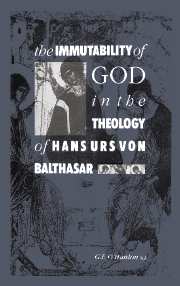Book contents
- Frontmatter
- Contents
- Acknowledgements
- Abbreviations
- Introduction
- 1 Christ and God's immutability
- 2 Creation and God's immutability
- 3 Time, eternity and God's immutability
- 4 Is the trinitarian God immutable?
- 5 Balthasar and other approaches
- 6 Final assessment
- Notes
- Bibliography
- Index of names
- Index of subjects
4 - Is the trinitarian God immutable?
Published online by Cambridge University Press: 05 October 2009
- Frontmatter
- Contents
- Acknowledgements
- Abbreviations
- Introduction
- 1 Christ and God's immutability
- 2 Creation and God's immutability
- 3 Time, eternity and God's immutability
- 4 Is the trinitarian God immutable?
- 5 Balthasar and other approaches
- 6 Final assessment
- Notes
- Bibliography
- Index of names
- Index of subjects
Summary
Introduction
The theme of this chapter is the immutability of God, the central issue of our enquiry, which in Balthasar's treatment is rooted in his account of the analogous event of inner-trinitarian love. The hypothesis that this event lay at the heart of Balthasar's theology of the divine immutability was amply verified in both the christological context and in the context of the relationship between creation and God. In the course of our treatment of the many topics which lay within these two main contexts we often referred to the need to examine this event in greater detail in order to come to a more precise grasp of its intelligibility and of the way in which it leads to a careful modification of the traditional notion of divine immutability in the theology of Balthasar. As always, we limit ourselves to those aspects of Balthasar's account which have a direct bearing on his position on the divine immutability. Accordingly, the scope of our treatment does not extend to a comprehensive account either of his theology of the Trinity or indeed of the Trinity as divine event. However it is within our scope to describe and explain this event in such a way that his position on the divine immutability becomes clear, and the required final assessment is made possible. We begin with a general description of Balthasar's account, which will be followed by a more explanatory treatment.
Description of Balthasar's trinitarian ‘event’
Balthasar accepts the traditional credal and Conciliar teaching on the Trinity as normative for his own theologising. This means that his theology of the trinitarian event is developed from within an explicitly traditional Christian view of the Trinity.
- Type
- Chapter
- Information
- Publisher: Cambridge University PressPrint publication year: 1990



